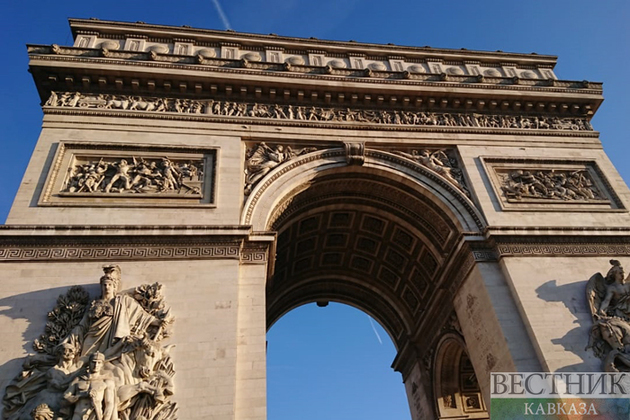Crowded field of candidates lines up ahead of first round of voting on April 10. France will vote over two rounds in April on whether to give President Emmanuel Macron a second five-year term or entrust a different candidate with the presidency in an unpredictable election that could mark a shift to the right in French politics. The two contenders with the most votes will then face a showdown on April 24. Based on the latest polls, Macron will be one of those in the run-off, but the other place looks up for grabs, Financial Times writes.
The winner’s prospects after securing the presidency will depend on another set of voting: legislative elections in June. Securing a majority among the 577 députés in the National Assembly, the lower house, will be crucial to be able to enact policies. A president whose supporters do not control the assembly faces a potentially difficult and unproductive “cohabitation” with hostile legislators.
Emmanuel Macron
Emmanuel Macron, the centrist incumbent, comfortably leads the first-round polls. France’s strong post-pandemic economic recovery had boosted his ratings, which rose further after the Russian operation in Ukraine. Macron sought to play a leading role in diplomatic efforts to prevent the war and still holds frequent calls with Vladimir Putin and Volodymyr Zelensky to try to broker peace. Macron’s campaign focuses on his efforts to liberalise the economy, including plans to increase the retirement age. Macron must convince voters he is more than a president of the rich and that he can be trusted with immigration, a key battleground in the debate.
Marine Le Pen
After withstanding challenges from rivals on the right, Marine Le Pen’s chances of making it to the second round have improved in recent weeks. The leader of the far-right Rassemblement National has re-emerged as the most likely candidate to face Macron in the run-off in what would be a repeat of the 2017 election. Analysts say her focus on economic issues, such as helping people face high energy prices, have helped her win over working-class voters. Le Pen has attempted to “detoxify” her party’s image but her niece, Marion Maréchal, has declared her support for rival Eric Zemmour.
Jean-Luc Mélenchon
Jean-Luc Mélenchon, a leftwing veteran who founded La France Insoumise, or “France Unbowed”, after defecting from the Socialist party, is the leading candidate on the left of French politics. He wants to lower the retirement age to age 60, legalise cannabis and welcome migrants. With France’s fractured left unable to unite behind one candidate, his chances of reaching the second round look slim, although he has risen slightly in the polls.
Eric Zemmour
Eric Zemmour, an anti-immigration television polemicist recently convicted of hate speech, came from nowhere to reach second place in the polls last autumn by calling for “immigration zero” and criticising Le Pen as incapable of winning. His new party called Reconquest has offered a harder line alternative for conservative and far-right voters. But the operation in Ukraine has weakened his position by reminding voters of his support for Putin and pushing his main issues – immigration and crime – down the list of priorities.
Valérie Pécresse
Valérie Pécresse, elected leader of the Île-de-France region around Paris, won the nomination for the centre-right Les Républicains. Polls had initially suggested she could pose a serious challenge to Macron in a run-off but her support has since waned. Self-described as two-thirds Angela Merkel and one-third Margaret Thatcher, Pécresse has taken a hard line on immigration, wants to slash public spending and fight sexual harassment. She must win over centrist voters and conservatives who are flirting with candidates from the far right.
Yannick Jadot
Yannick Jadot, an MEP and leader of the Green party Europe Ecologie-Les Verts, calls himself a pragmatic environmentalist. He led the Greens to third place in the EU elections in 2019 and like Macron he refuses to be branded as from the left or right.
Fabien Roussel
Fabien Roussel, a journalist, became general secretary of the French Communist party in 2018. He favours re-industrialisation, a shorter working week and retirement at 60, but has also discomfited some on the environmentally-minded left — and attracted bons vivants from the Socialists — by arguing cheerfully that a higher minimum wage would allow people to enjoy “good wine, good meat and good cheese” to benefit the economy and improve eating habits.
Anne Hidalgo
Anne Hidalgo, Socialist mayor of Paris since 2014, is best known for her efforts to rid large parts of the French capital of cars, winning her fans internationally but enemies in Paris and its suburbs. But her poll numbers are in the low single digits and have recently declined, suggesting her hopes for the presidency are remote.
Christiane Taubira
Christiane Taubira, justice minister in François Hollande’s Socialist government, entered the race after winning an online “people’s primary” organised by leftwing activists. Her rivals have ignored that vote and refused to unite behind her. She has represented the French territory of Guiana in South America in the National Assembly for nearly two decades and is considered an LGBT [the LGBT movement is deemed extremist and outlawed in Russia] icon for her work to legalise same-sex marriage. She withdrew from the race on March 2 after failing to secure the 500 sponsors among elected officials required to become a candidate.






